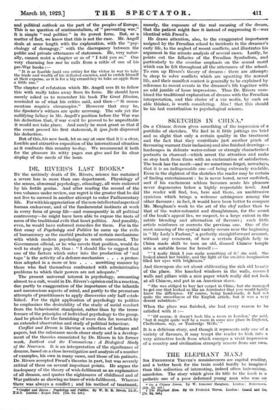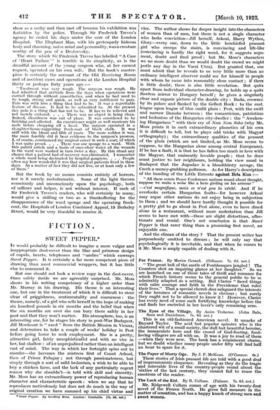THE ELEPHANT MAN.i .
Sin FREDERICK Tanvra's reminiscences are capital reading, and a better book for the train could hardly be imagined than this collection of interesting, indeed often hair-raising, anecdotes. The story which gives its title to the book is a pathetic one of a poor deformed young man who was on • On a Chinese Screen. 3y W. Somerset Mangham. London: Heinemann. Gd. net.] t The Eleph4nt Men, By Sir Frederick Treves, London: Careen sad Co, L7a. 04, show as a rarity and then cast off because his exhibition was forbidden by the police. Through Sir Frederick Treves's agency he ended his days under the care of the London Hospital. The Elephant Man, with his grotesquely hideous body and charming, naive mind and personality, was a creature worthy of the pen of a Dostoevsky.
The story which Sir Frederick Treves has labelled "A Case of Heart Failure'" is terrible in its simplicity, as is the dreadful account of the young surgeon who, at her earnest request, operated on his own wife. But the book's master- piece is certainly the account of the Old Receiving Room and of accident cases and operations at the London Hospital thirty or perhaps forty years ago :—
"Treatment was very rough. The surgeon was rough. He had inherited that attitude from the days when operations were carried through without anaesthetics, and when he had need to be rough, strong and quick, as well as very indifferent to pain. Pain was with him a thing that had to be. It was a regrettable feature of disease. It had to be submitted to. At the present day pain is a thing that has not to be. It has to be relieved and not merely endured. . . . There was no object in being clean. Indeed, cleanliness was out of place. It was considered to be finicking and affected. An executioner might as well manicure his nails before chopping off a head. The surgeon operated in a slaughter-house-suggesting frock-coat of black cloth. It was stiff with the blood and filth of years. The more sodden it was, the more forcibly did it bear evidence to the surgeon's prowess. I, of course, commenced my surgical career in such a coat, of which I was quite proud. . . . There was one sponge to a ward. With this putrid article and a basin of once-clear water all the wounds in the ward were washed in turn twice a day. By this ritual any chance that a patient had of recovery was eliminated. I remember a whole ward being decimated by hospital gangrene. . . . People often say how wonderful it was that surgical patients lived in these days. As a matter of fact they did not live, or at least only a few of them."
But the book by no means consists entirely of horrors, nor is it merely melodramatic. Some of the light thrown consciously and unconsciously upon the psychology, both of sufferer and helper, is not without interest. If each of Sir Frederick Treves's readers, who will certainly be many, would give a shilling or two as a thankoffering for the disappearance of the ward sponge and the operating frock- coat, the Hospitals of London Combined Appeal, 19 Berkeley Street, would be very thankful to receive it.











































 Previous page
Previous page